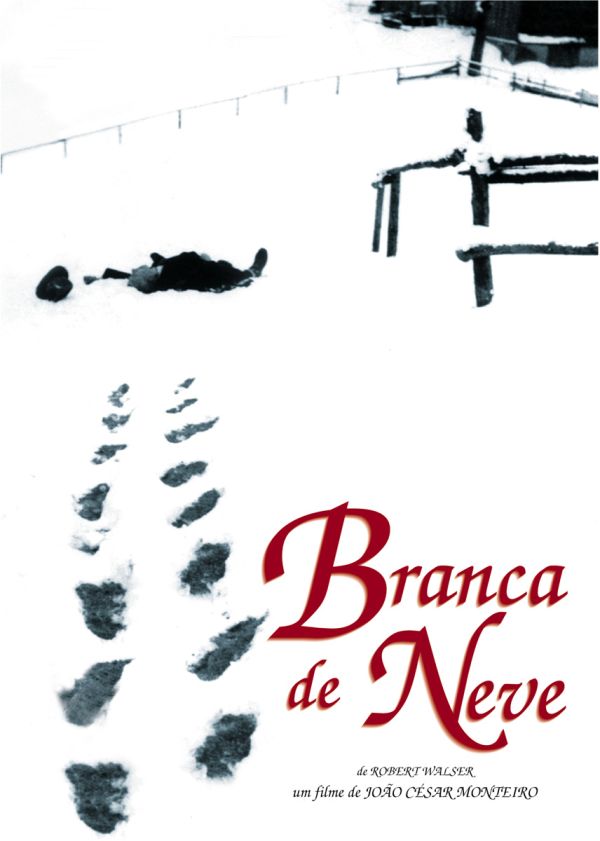Branca de Neve (2000)
Snow White
65 min
Realização: · João César Monteiro
Argumento: · João César Monteiro
[After Walter Benjamin Robert Walser picks up the story where Grimm left off. At the hands of the poet, the characters are given a free rein, even to the extent of poking fun at the tale.
How presumptuous of the prince to have disturbed Snow White in her beauty sleep, to have kissed her (something she will forever deny) and removed her from her glass casket in order to restore her to life, i.e., in order to possess her in the flesh.
In this petty drama Walser remains imbued in the conflicts of childhood. One notices the father's absence - it is always the mother, or stepmother, that the heroin must confront.
If Snow White would rather die or return to the land of her dwarfs, it may be because she doubts the goodwill of her stepmother. After all, didn't she try and poison her? When Snow White was rescued by the prince and thereby restored to life did not the queen, thanks to her kisses, incite the hunter to knife her?
And here we have the prince and the young girl, as pure as her name implies - evoking for us Walser's own death in the snow - terrified by the bestial scene they witness between the queen and the hunter. The man is on top of the woman and their posture seems to the two young innocents amazingly brutal. Is this what love is? A grappling of flesh?
Poisoned kisses, love and crime intimately interwoven. It is imperative that we put right Grimm's tale. The mother, stepmother, could not possibly have been so wicked - it would have been unbearable.
But Snow White must learn that love and hate are never far apart. She understands. Like Robert, she felt "hurt, ostracised/persecuted, hated". She was just being silly and now all's well that ends well. She has opted for happiness. But at what price? The dilemma is almost hamlet-like: the affirmation of a little "yes" means renouncing a big "no". The sun melts the last snowflakes.
Society does not harbour the mythical world.
Le bonheur n'est pas gai.
Oh night, shrouded by the moon, is it snow yet ?
(Marie-Louise Audiberti/João César Monteiro)
Source: Atalanta Filmes]
- [Trailer]
- Ana Brandão · Rainha
- Carmo Rolo
- Diogo Dória · Rei
- José Airosa
- Luís Miguel Cintra · Caçador
- Maria do Carmo · Branca de Neve
- Miguel Borges
- Rita Durão
Argumento: · João César Monteiro
Direcção de Fotografia: · Hélène Louvart · Mário Barroso
Direcção de Produção: · Alexandre Oliveira · Alexandre Valente [Durante a Preparação]
Direcção de Som: · Joaquim Pinto
Mistura de Som: · Joaquim Pinto
Montagem: · Carla Bogalheiro
Música: · Heinz Holliger · Gioachino Rossini · Salvatore Sciarrino
Produção: · Paulo Branco
Realização: · João César Monteiro

Que imprudente ideia, a do príncipe, ter interrompido Branca de Neve no melhor dos sonos e, com um beijo que ela negará sempre, retirá-la do caixão de vidro para a restituir à vida, isto é, à carne, e arrogar-se direitos sobre ela.
Neste "dramolete", Walser está ainda mergulhado nos conflitos da infância. Nota-se aqui quando o pai é inexistente. É sempre com a mãe, ou a madrasta, que a heroína se deve confrontar.
Se Branca de Neve deseja morrer ou regressar ao país dos seus anões, é porque não está convencida da boa-fé da rainha. A sua madrasta não quis envenená-la? Quando Branca de Neve, salva pelo príncipe, voltou à vida, a rainha, graças aos seus beijos, não incitou, acto contínuo, o caçador a apunhalá-la?
E eis o príncipe e a jovem, tão pura quanto o seu nome indica, - o qual evoca para nós a morte de Walser na neve - aterrorizados por uma cena bestial entre a rainha e o caçador. O homem está deitado sobre a mulher e as suas atitudes parecem aos dois inocentes uma brutalidade espantosa. O amor será isto? Uma luta encarniçada?
Beijos envenenados, amor e crime intimamente imbricados, é absolutamente imprescindível corrigir o conto de Grimm. A mãe, madrasta, não pode ser tão malvada, seria insuportável. Mas Branca de Neve deve aprender que amor e ódio não estão nunca muito afastados. Ela compreende. Julgava-se - como Robert - "ferida, expulsa, perseguida, odiada". Era apenas tonta e agora tudo acaba em bem. Branca de Neve escolheu ser feliz.
Por que preço? O dilema é quase hamletiano: a afirmação da pequenez do sim, implica a renúncia à grandeza do não. Os derradeiros flocos de neve derretem-se ante o triunfo dos raios solares. O mundo social não hospeda o mundo mítico.
Le bonheur n'est pas gai.
Ó noite, coberta pelo teu manto de lua: a neve, a neve ainda?
[Marie-Louise Audiberti / João César Monteiro]